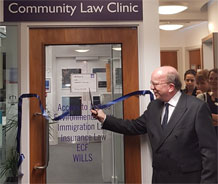
High Court Judge Sir Robin Knowles cut the ribbon.
Ribbon cutting by Sir Robin Knowles celebrates contributions by Exeter law students
On November 29, the University of Exeter Community Law Clinic held a day of celebrations and collaboration to recognize the work done by Exeter law students.
The day began at the Exeter Combined Courts with a Regional LiP (Litigants in Person) Workshop, spearheaded by Professor Sue Prince, the workshop was led by High Court Judge Sir Robin Knowles, who chairs the Civil Justice Council’s work on access to justice. The workshop aimed to foster connections between local charities, legal professionals, judges, and the University. The University was represented by law school staff Professor Sue Prince, Senior Lecturer Tia Matt, and lecturer Natasha Bellinger. Addressing a clear lack of funding and assistance in the region, the University was recognised as an important resource for the future of access to justice.
Collaborations continued back on Campus where Tia Matt, co-creator and director of the Community Law Clinic, hosted a session for workshop attendees and students to identify key problems with access to justice. Students of the Clinic presented a few examples of the many cases the Community Law Clinic handled over the last year. One example involved an immigration client that faced removal from the UK by the Home Office. In that case, the students aided in an appeal to the immigration first tier-tribunal, where the client was successful. Another client needed an employment contract reviewed. The students identified clauses that purported to remove basic statutory rights, which the client could take back to the employer for revision.
The esteemed guests, including judges, barristers, representatives from the Ministry of Justice, charities, staff, and students then gathered for the official ribbon cutting ceremony at the Community Law Clinic. Sir Robin Knowles cut the ribbon. As a grand finale for the day, Sir Robin Knowles gave an enlightening talk titled, “Working towards Access to Justice for All”.
The Community Law Clinic is actually made up of six distinct law clinics: wills, immigration law, environmental law, exceptional case funding, insurance law, and access to justice (employment, housing, benefits, crime). Its primary mission is to give free legal information and advice to help reduce the gap in legal services created by the legal aid cuts. The Clinic is staffed by third year students that are supervised by lecturers/legal practitioners, Tia Matt and Natasha Bellinger. Clients are referred to the Clinic by lawyers and charities, either by appointment or they may turn up at the twice-a-month sessions at the St Sidwell’s Community Centre in Exeter.
Feedback from the legal community and clients has been very positive. Clients frequently send praise, such as, “It is so good to think that someone may be able to help at last” and, “I’m hugely grateful to you. I need to know where I stand one way or the other.”
Tia Matt, said, “It is fantastic to see the dedication of the students, who put such hard work into helping people in difficult situations. I’m very proud of the sensitive and professional advice they are offering. Our service really is changing people’s lives. It helps prepare students for their future careers while allowing them to give something back to their local community. Overall, it is a very rewarding experience.”
There are 100 students participating in the Clinic, but the laws school’s pro bono efforts don’t stop there. The law school also provides pro bono services through the Exeter Law Projects, also supervised by Matt and Bellinger. These projects connect 350 students to external pro bono service providers throughout the Southwest. Through these combined efforts, the law school boasts a total of 450 students participating in pro bono work. This unprecedented level of engagement is a testament to the character of Exeter law students.
Further information on the Community Law Clinic and the Exeter Law Projects.
